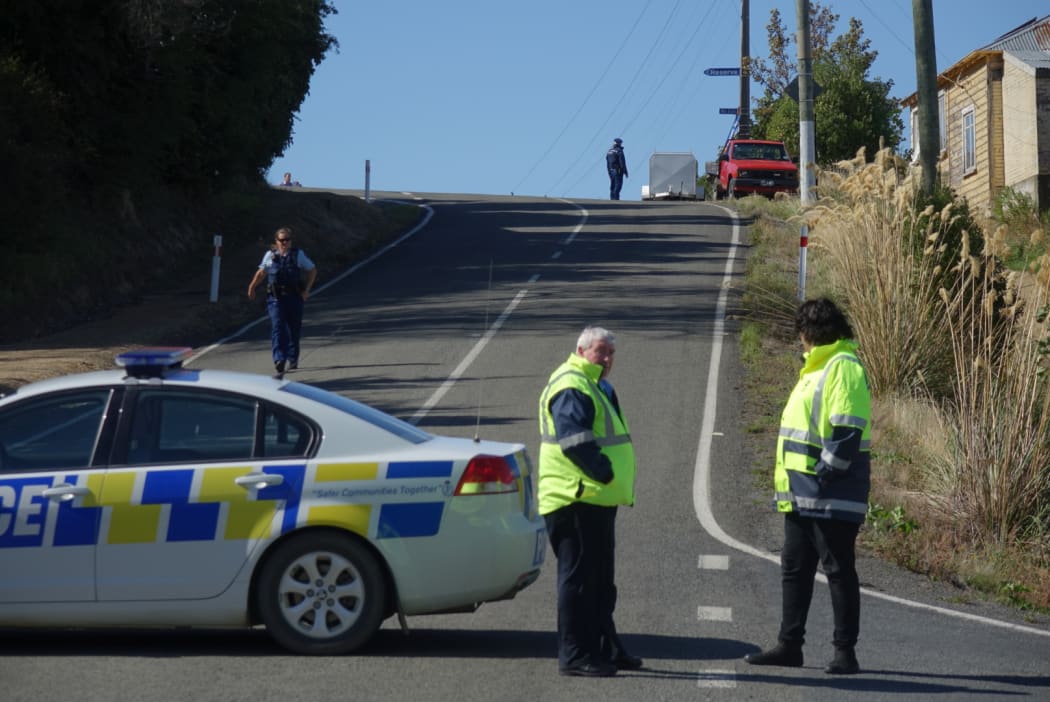The Independent Police Conduct Authority (IPCA) looked into police handling of a dispute between Seacliff neighbours which turned deadly.

A section of Coast Road was closed after Ms Comerford was found dead inside a property. Photo: RNZ/ Ian Telfer
Stephen Findlay, 60, was yesterday sentenced to life imprisonment with a minimum non-parole period of 11 years for the murder of 54-year-old Sharon Comerford in the sleepy seaside township about 30km north of Dunedin.
The pair had a fractious on-again-off-again relationship for six years leading up to the slaying.
On 7 March last year Findlay texted a local police officer and called the crime reporting line alleging Ms Comerford had "shaved me very close with her vehicle" in an attempt to intimidate him.
Only a few hours later Findlay bludgeoned Ms Comerford to death, hitting her in the head 12 times with a blunt instrument.
Early the following day he went to the nearby Truby King Reserve and shot himself, sustaining critical injuries.
Police confirmed an internal investigation into the handling of the dispute was carried out, and the matter was referred to the Independent Police Conduct Authority.
"Police conduct internal debriefs into serious investigations and major operations as a matter of course," a police spokesperson said.
"From these we learn what went well, as well as opportunities to improve.
"In this particular case police also conducted an internal investigation into a call made to the Police Communications Centre in relation to a driving matter. It was reported to the IPCA and resolved."
Police refused interview requests regarding handling of the case and said they had "nothing further to add to our statement".
IPCA complaints manager Pieter Roozendaal said the police watchdog assessed the police referral.
The authority requested further information from police before deciding "it didn't require further action on our part".
He would not comment on what aspect of police handling of the matter was looked at or the specifics of the referral.
The authority would reassess the matter if a complaint was received, he said.
"This is a referral from police. We haven't received a complaint from any other party.
"If Mr Findlay or any member of his family wanted to make a complaint we could revisit the matter."
The court heard yesterday how the 7 March murder came after several complaints from Findlay to police about Ms Comerford.
On 18 February 2016, he sought a trespass order against the victim, but ultimately did not pursue the matter after speaking to police, a summary of facts said.
Two days later he again contacted police after receiving 26 abusive text messages from the victim in the preceding 26 hours.
"The police officer spoke with the victim who acknowledged she had done a 'stupid thing' after being handed the defendant's lost cellphone," the summary said.
"The victim said she had sent texts to people in his contacts to let them know what he was really like."
On 26 February 2016, he again contacted police about the victim and told them she was "growing dope".
Findlay's lawyer, Judith Ablett-Kerr QC, said the pair were alcoholics who had often clashed and during their turbulent relationship the defendant had been subject to "physical and psychological abuse" at the hands of the victim.
Justice Rachel Dunningham accepted there was an element of provocation in the case, which was one of the reasons she elected for a non-parole period of less than the mandatory 17-year-term required in murders displaying a high level of brutality.




